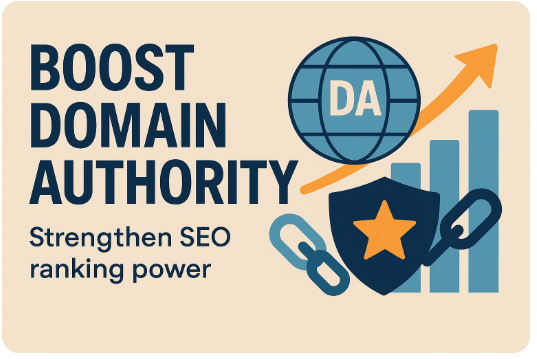In the ever-evolving world of search engine optimization (SEO), few metrics have gained as much prominence and debate as Domain Authority (DA). Developed by Moz, Domain Authority is a ranking score that predicts how well a website will rank on search engine result pages (SERPs). While not an official metric used by Google, DA has become a widely referenced tool among marketers and SEO professionals. This article delves into the role and impact of Domain Authority on SEO, exploring its benefits, limitations, and practical applications.
Understanding Domain Authority
Domain Authority scores range from 1 to 100, with higher scores indicating a greater likelihood of ranking well on SERPs. Moz calculates this metric using multiple factors, including linking root domains and the number of total links. The score is then modeled on a logarithmic scale, meaning that improving your DA from 20 to 30 is much easier than moving from 70 to 80.
While Google has repeatedly stated that it does not use Domain Authority as a ranking factor, the metric serves as a proxy for understanding a website’s overall link profile strength—a critical component of SEO success. Marketers use DA to benchmark their website against competitors, strategize link-building efforts, and gauge the effectiveness of their SEO campaigns.
The Benefits of Domain Authority
- Competitive Benchmarking One of the most significant advantages of Domain Authority is its ability to provide a comparative metric. By analyzing the DA of your website and that of your competitors, you can identify gaps in your link-building strategy and content quality. For instance, if your competitors consistently outrank you on SERPs and have higher DA scores, it might indicate stronger backlinks or better content optimization.
- Guidance for Link-Building Strategies Backlinks are a cornerstone of SEO, and Domain Authority can guide link-building efforts. High DA websites generally have more authoritative backlinks, making them desirable partners for collaborations, guest posts, and citations. By targeting websites with higher DA scores, you can potentially improve your site’s own DA over time.
- Progress Tracking Domain Authority offers a tangible way to measure the impact of your SEO efforts over time. A rising DA score can indicate that your link-building and content strategies are paying off, even if your rankings haven’t yet improved significantly.
- Simplification of Complex Metrics SEO is inherently complex, involving numerous factors like page speed, user experience, and keyword optimization. DA consolidates many of these aspects into a single, understandable score, making it easier for non-experts to grasp their website’s SEO health.
The Limitations of Domain Authority
While Domain Authority is a useful tool, it is not without its flaws. Blind reliance on DA can lead to misguided strategies and missed opportunities. Here are some of its key limitations:
- Not a Google Metric Perhaps the most important limitation of Domain Authority is that it is not an official ranking factor for Google. While DA can correlate with higher rankings, it is ultimately an approximation of a site’s link profile and not a guarantee of SERP success.
- Overemphasis on Backlinks Domain Authority places significant weight on backlinks, potentially overshadowing other critical SEO factors like content quality, technical optimization, and user experience. Focusing solely on increasing DA might lead to neglecting these equally important aspects.
- Inaccuracy for Niche Sites Websites operating in niche industries often face challenges in achieving high DA scores due to a limited number of authoritative linking opportunities. A lower DA does not necessarily mean that these sites cannot rank well for specific, targeted keywords.
- Delayed Reflection of Changes Domain Authority is not updated in real-time, meaning that recent SEO improvements or penalties may not be immediately reflected in the score. This lag can be frustrating for marketers looking for immediate feedback on their efforts.
Practical Applications of Domain Authority
Despite its limitations, Domain Authority can be a valuable tool when used appropriately. Here are some practical applications:
- Competitor Analysis Use DA to compare your site’s authority with that of your competitors. Identify which competitors have higher DA scores and analyze their backlink profiles, content strategies, and keyword targeting to uncover potential areas for improvement.
- Quality Control for Backlinks When evaluating backlink opportunities, DA can serve as a quick gauge of a site’s quality. However, it is essential to combine this metric with other assessments, such as relevance and traffic quality, to ensure you’re building a well-rounded link profile.
- Tracking SEO Progress Monitor changes in your Domain Authority score as part of your broader SEO strategy. While it should not be the sole metric you rely on, it can provide insights into the effectiveness of your link-building and outreach efforts.
- Identifying Link-Building Targets DA can help prioritize outreach efforts by identifying high-authority sites in your niche. Building relationships with these sites can enhance your credibility and improve your site’s DA.
The Debate: How Much Should You Care About Domain Authority?
The importance of Domain Authority is a topic of ongoing debate within the SEO community. Critics argue that it creates a false sense of hierarchy, encouraging marketers to chase high DA scores rather than focusing on user-centric strategies. Proponents, however, view it as a useful benchmark in an otherwise opaque industry.
Balancing Domain Authority with Holistic SEO
To make the most of Domain Authority without over-relying on it, consider these best practices:
- Focus on User Intent While DA can help you understand your site’s link profile, user intent should remain at the forefront of your SEO strategy. Ensure that your content aligns with what your target audience is searching for and provides real value.
- Diversify Your Metrics Supplement your reliance on Domain Authority with other metrics, such as organic traffic, bounce rate, and conversion rates. These indicators offer a more comprehensive view of your site’s performance.
- Invest in Quality Content High-quality, engaging content is more likely to attract natural backlinks, which in turn can improve your DA. Focus on creating resources that your audience finds useful and shareable.
- Maintain Technical SEO A robust technical foundation, including fast loading times, mobile-friendliness, and secure connections, can enhance your site’s overall performance and rankings, regardless of its DA score.
- Stay Updated on SEO Trends The SEO landscape is constantly evolving, with search engines regularly updating their algorithms. Staying informed about industry trends ensures that your strategy remains effective and adaptable.
In closing:
Domain Authority remains a polarizing yet influential metric in the world of SEO. While it provides valuable insights into a site’s link profile and competitive standing, it is not a definitive measure of success. By understanding its benefits and limitations, marketers can use DA as part of a holistic SEO strategy that prioritizes user experience, high-quality content, and technical optimization.
In the end, the true impact of Domain Authority on SEO depends on how it is used. Treat it as a helpful guide rather than an ultimate goal, and you’ll be well-positioned to navigate the complexities of search engine optimization.
Frequently Asked Questions (FAQ):
Q: What is Domain Authority (DA)?
A: Domain Authority is a third‑party metric from Moz (scored 0–100) that estimates how likely a domain is to rank, primarily based on its backlink profile.
Q: Is DA a Google ranking factor?
A: No. Google doesn’t use DA. It’s a proxy metric from Moz. Use it directionally while focusing on content quality, relevance and natural links.
Q: Does DA impact SEO results?
A: Indirectly at best. Higher DA often correlates with stronger links and better visibility, but pages can rank well with lower DA if they’re highly relevant and well optimised.
Q: What’s a good DA for a small business site?
A: It’s relative. Compare your DA to direct competitors in your niche and location. Many local sites sit in the teens or 20s—aim to be competitive, not to hit a universal number.
Q: How can I increase my site’s DA?
A: Earn relevant, high‑quality backlinks, publish useful content, improve internal linking, and fix technical issues. Avoid spammy link schemes—they can harm your site.
Q: How long does it take to improve DA?
A: Usually weeks to months. It depends on the quality/quantity of links you earn and when Moz’s index updates. Expect gradual changes, not overnight jumps.
Q: DA vs DR vs TF/CF—what’s the difference?
A: They’re different companies’ authority metrics (Moz DA, Ahrefs DR, Majestic TF/CF) with different data sources and scales. Pick one, track trends, and compare against competitors.
Q: Can a low‑DA site still rank?
A: Yes. For long‑tail and local queries, strong on‑page SEO, topical depth and helpful content can outrank higher‑DA competitors.
Q: How do I check my DA?
A: Use MozBar or Moz Link Explorer, or SEO tools that surface DA. Scores can vary between tools because each uses its own data.
Q: Will changing domains affect DA?
A: DA is tied to a domain. A well‑planned migration with 301 redirects can pass link equity signals, but third‑party scores may dip and then rec



